Key takeaways:
- Uncertainty during the Covid-19 pandemic significantly impacted mental well-being, leading to feelings of doubt and fear.
- Coping strategies like journaling, mindfulness, and establishing routines can help manage anxiety and foster resilience.
- Engagement in physical activity and connection with support networks provide relief and strengthen emotional bonds amidst uncertainty.
- Personal reflections and creative outlets serve as effective tools for processing emotions and finding hope during challenging times.
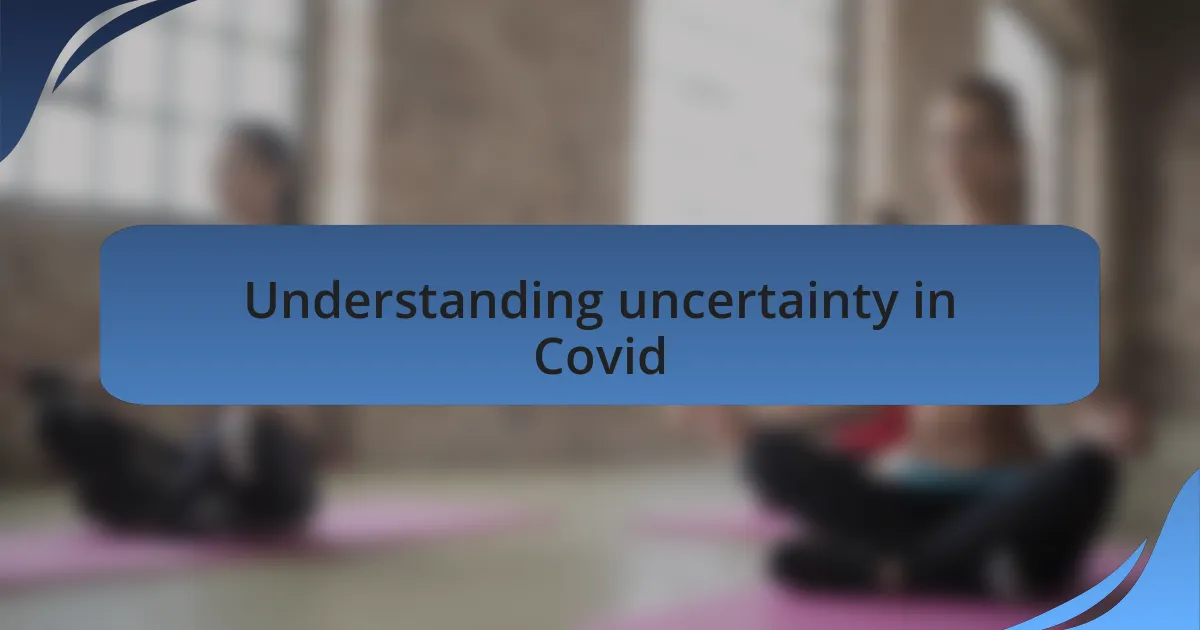
Understanding uncertainty in Covid
Throughout the Covid-19 pandemic, uncertainty has been a constant companion. I found myself grappling with unpredictable news about infection rates, mandates, and vaccine developments. Have you ever felt that sense of unease wash over you as new restrictions were announced? It’s a feeling many of us share, and it can be deeply unsettling.
As days turned into weeks and months, I noticed how uncertainty affected my mental well-being. I often felt a cloud of doubt hovering over my daily decisions. For instance, the decision to meet friends or attend an event seemed fraught with potential risks. How many of us have replayed those what-if scenarios in our minds, wondering if we were making the right choice?
It became clear to me that living with uncertainty isn’t just about external factors; it touches on our internal landscapes too. We might feel overwhelmed by fear of the unknown, but it’s also an opportunity for growth. How can we reshape our perspectives to embrace the unknown rather than feel paralyzed by it? Finding ways to acknowledge and navigate through those feelings is an essential part of our journey.
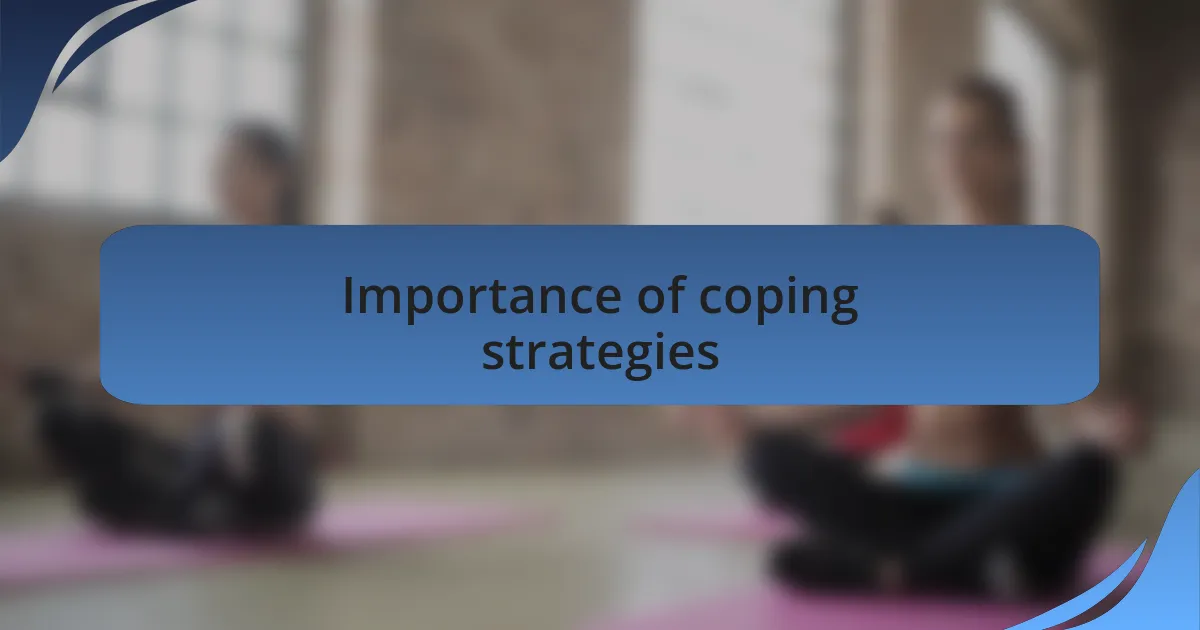
Importance of coping strategies
Coping strategies are crucial when navigating the choppy waters of uncertainty, particularly during a crisis like the Covid-19 pandemic. I remember implementing simple practices like journaling to process my feelings. This small act helped me feel grounded and clarified my thoughts amid the chaos.
Having effective coping mechanisms instills a sense of control, even when so much feels unpredictable. For example, I started engaging in mindfulness exercises, which allowed me to focus on the present rather than spiraling into concerns about the future. It made me realize that finding solace in routine can provide comfort amidst the turbulence, reminding me of what truly matters.
Moreover, I’ve found that sharing my experiences with friends or loved ones creates a supportive network, alleviating some of the weight of uncertainty. Have you ever reached out to someone only to discover they shared similar fears? This connection fosters resilience; together, we can learn to confront uncertainty rather than shrink from it, transforming our challenges into opportunities for deeper understanding.
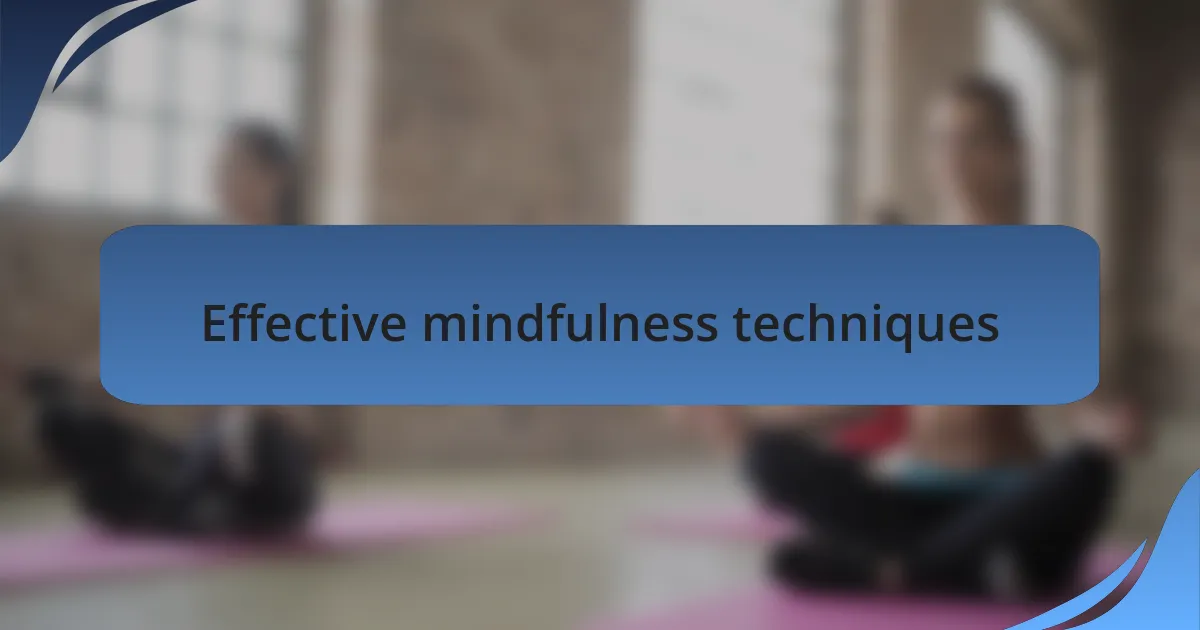
Effective mindfulness techniques
Practicing mindfulness techniques has been a game changer for me. One of the simplest methods I incorporated was focused breathing. Whenever I felt overwhelmed, I would take a moment to inhale deeply, hold for a count of four, and then exhale slowly. This practice not only calms my mind but also helps me re-center my thoughts when uncertainty looms.
Another technique that resonates deeply with me is body scanning. This involves mentally checking in with different parts of my body and noticing areas of tension. I remember one evening, as I lay on the floor, I imagined warmth flowing through my limbs, releasing tightness and anxiety. Have you ever felt the physical weight of stress? This exercise not only alleviates those feelings but also cultivates an essential connection to my body.
Additionally, I’ve found gratitude journaling to be incredibly effective. Each evening, I jot down three things I appreciated from my day. It’s remarkable how such a simple practice can shift my perspective and foster a sense of positivity. Do you take a moment to reflect on the good amidst the chaos? Focusing on gratitude opens the door to hope, helping to balance the uncertainty with a sense of joy and fulfillment.
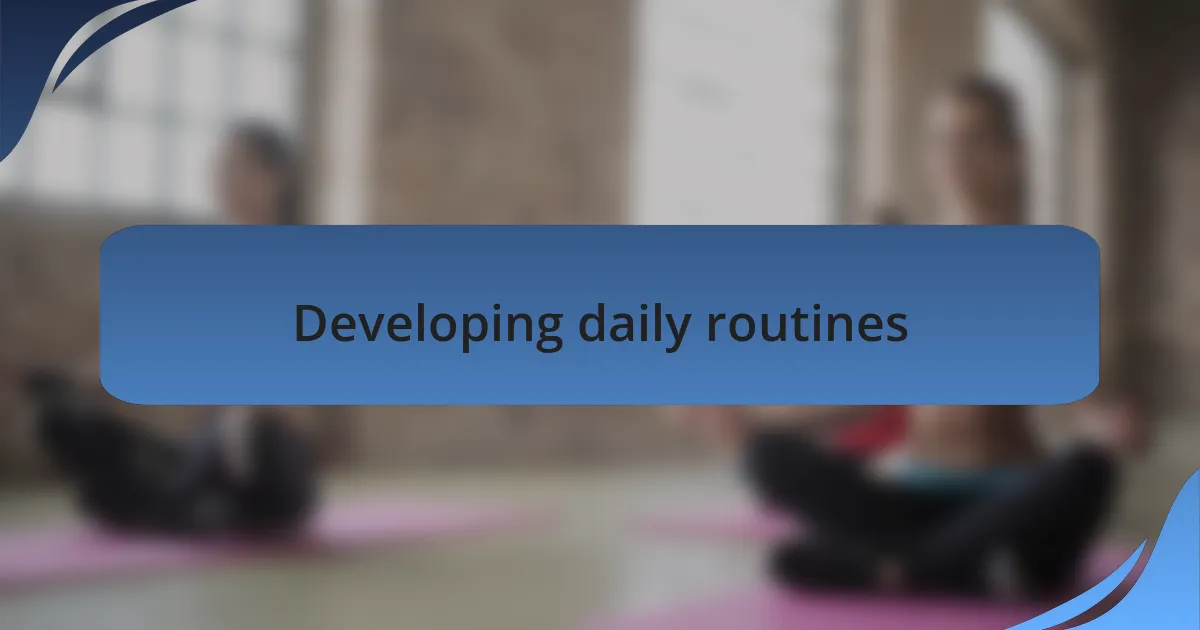
Developing daily routines
Establishing a daily routine has been one of the most empowering steps I took during uncertain times. When I started setting specific times for waking up, meals, and even my evening wind-down, something profound shifted. I felt a sense of normalcy that was incredibly comforting amidst all the chaos.
One practice I incorporated is a morning ritual that includes stretching and sipping tea while gazing out the window. It might sound simple, but this little moment of peace helps me set a positive tone for the day ahead. Have you ever noticed how starting your day with intention can change your entire outlook? It’s astonishing how small actions can ground us when the world feels unpredictable.
In the evening, I often dedicate time to reading or journaling, which provides a gentle transition from the busyness of the day to a more serene state. I recall a night when I wrote about my worries and realized how unburdening my thoughts helped me feel lighter—almost as if I was sharing the load with my journal. What do you do to wind down after a stressful day? Finding that consistent space to reflect or unwind can be a powerful antidote to uncertainty.
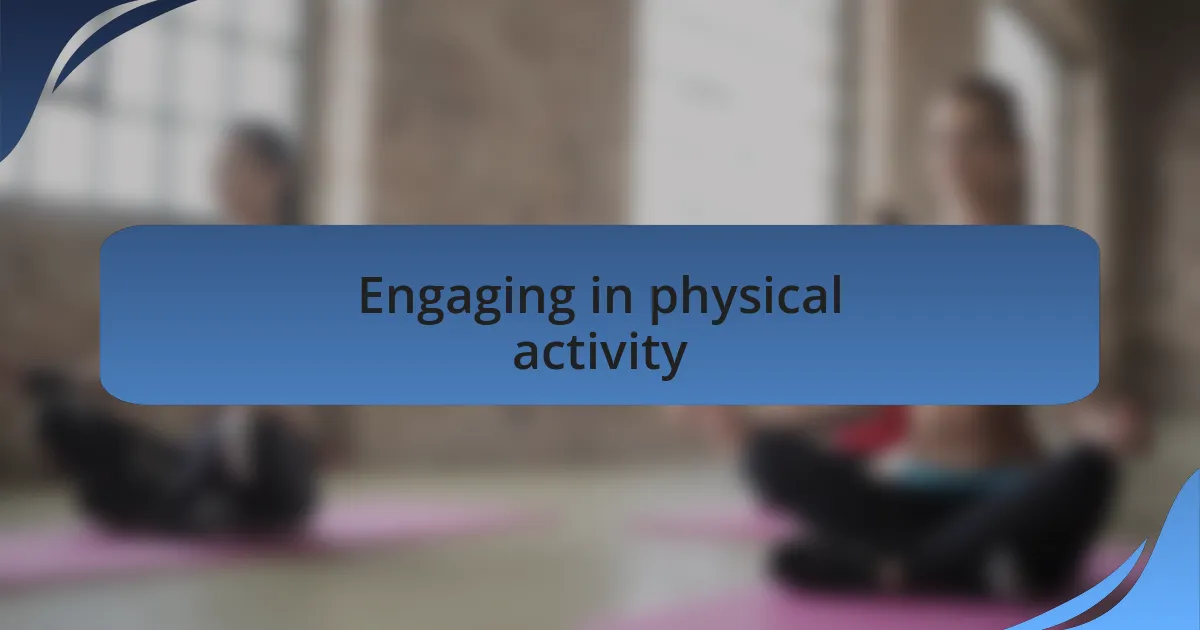
Engaging in physical activity
Engaging in physical activity has been a game changer for me when confronting uncertainty. Whether it’s a brisk walk or a home workout session, moving my body allows me to release pent-up energy and stress. Have you ever felt that rush of endorphins after a good run? It’s like finding a hidden well of strength I didn’t know existed.
I remember the first time I decided to try yoga during a particularly anxious week. As I flowed through each pose, I felt the weight of my worries begin to lift. Focusing on my breath shifted my perspective, reminding me that despite the chaos around us, I could find calm within. How often do we forget that our bodies are powerful tools for managing our emotions?
Sometimes, I even invite friends for a mini workout or an outdoor sport. It’s not just exercise; it transforms into shared laughter and connection, which I find incredibly soothing. Those moments feel like a collective embrace against the unpredictability of life. How do you incorporate movement into your day? It’s fascinating how simply being active can create bonds and rejuvenate our spirits.
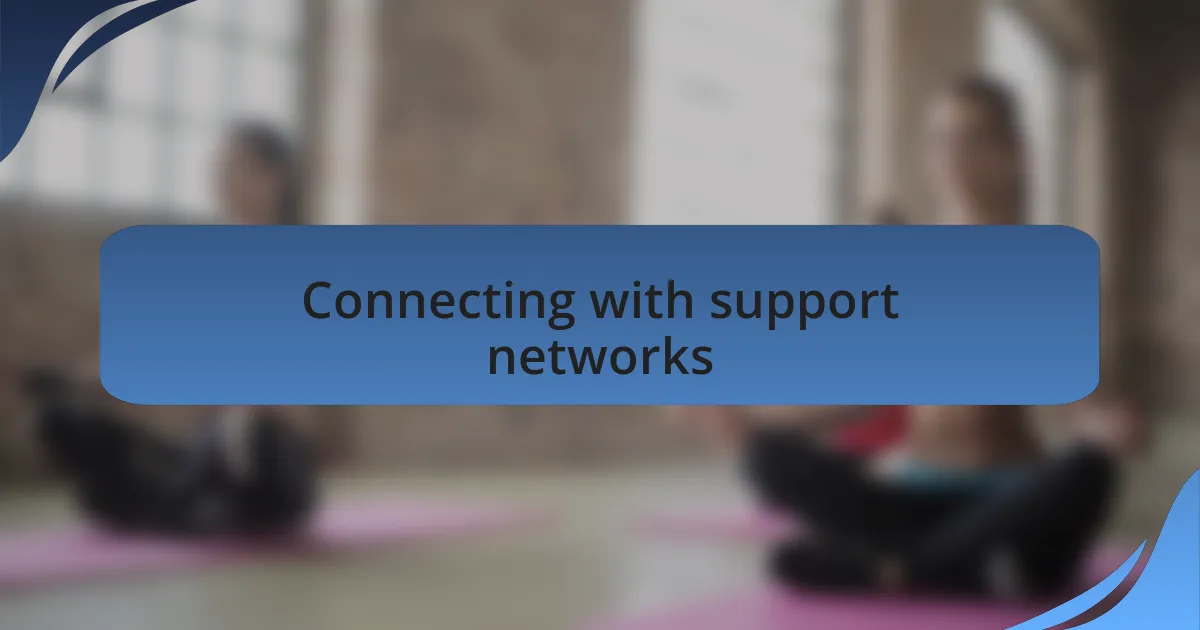
Connecting with support networks
Connecting with support networks can be one of the most reassuring ways to handle uncertainty. I remember reaching out to friends during the height of the pandemic, feeling the weight of isolation. A quick phone call or a video chat would remind me that I wasn’t alone in my struggles. Did you ever find comfort in simply sharing your thoughts with someone who understands?
There was a time when I joined a local online support group focused on mental well-being. It was eye-opening to hear diverse perspectives on coping strategies. Every shared story felt like a thread connecting us, weaving a fabric of understanding and resilience. Have you ever experienced that sense of belonging, even in a virtual space? It’s a powerful reminder that while we each face our own battles, we can also lift each other up.
When I felt overwhelmed, a friend organized a virtual game night, and it turned into a lifeline for all of us. Through laughter and friendly competition, we momentarily escaped our worries, fostering a sense of community that was truly invaluable. How often do we overlook the simple joy of connecting with others for support? It’s amazing how these small moments can help us navigate through uncertainties together.
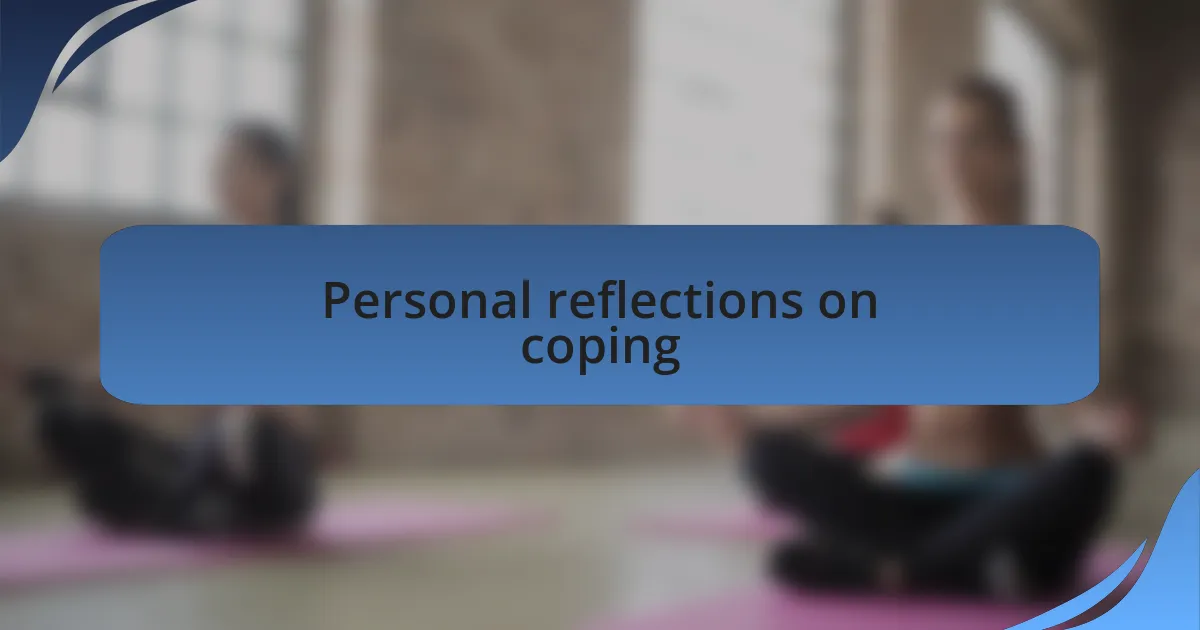
Personal reflections on coping
In my journey through uncertainty, I’ve often turned to journaling as a refuge. Penning down my thoughts and feelings not only allowed me to process my emotions but also provided clarity amid the chaos. Have you ever felt that rush of relief when you spill your heart out onto paper? It’s like having a conversation with yourself, and it’s incredibly freeing.
When the uncertainty felt particularly heavy, I found solace in daily rituals. A morning cup of tea or an evening walk became anchors in my day, grounding me amidst the swirling changes around us. Do you have routines that bring you some comfort during turbulent times? Those small moments of familiarity helped me regain a sense of control and balance, which was so crucial then.
I’ve also discovered that creativity can act as a powerful coping mechanism. Whether it was painting, cooking, or even writing poetry, channeling my emotions into something tangible felt rewarding. Remember that time when you lost yourself in a creative project? It’s remarkable how engaging in these activities can transform raw feelings into expressions of hope and resilience.